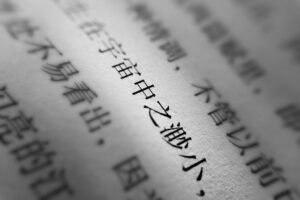Daily talks sometimes include making educated estimates and assumptions. There are several methods to express these ideas in Mandarin. Here’s a closer look at the key words and grammar structures for expressing assumptions in Mandarin.
Table of Contents
Toggle1. 应该 (yīng gāi) – Should / Probably
This word is used to express a logical assumption based on known facts. Example:
- 他应该已经到家了。 (Tā yīng gāi yǐ jīng dào jiā le.) – He should have arrived home by now.
2. 可能 (kě néng) – Might / Maybe / Probably
Less certain than 应该, indicating a possibility. Example:
- 她可能不来了。 (Tā kě néng bù lái le.) – She might not come.
3. 大概 (dà gài) – Probably / Roughly / About
Used for rough estimations or guesses. Example:
- 大概三个小时就可以完成。 (Dà gài sān gè xiǎo shí jiù kě yǐ wán chéng.) – It can probably be done in about three hours.
4. 估计 (gū jì) – Estimate / Guess
Used to make predictions based on current situations. Example:
- 我估计明天会下雨。 (Wǒ gū jì míng tiān huì xià yǔ.) – I guess it will rain tomorrow.
5. 好像 (hǎo xiàng) – Seems Like / Appears To Be
Indicates something appears a certain way. Example:
- 他好像生病了。 (Tā hǎo xiàng shēng bìng le.) – He seems to be sick.
6. 据我看 (jù wǒ kàn) – In My Opinion / As I See It
Personal assumptions or judgments. Example:
- 据我看,这本书值得一读。 (Jù wǒ kàn, zhè běn shū zhí dé yī dú.) – In my opinion, this book is worth reading.
7. 看起来 (kàn qǐ lái) – Looks Like / Seems
A common way to describe a visual observation. Example:
- 看起来要下大雨。 (Kàn qǐ lái yào xià dà yǔ.) – It looks like it’s going to pour.
8. 想必 (xiǎng bì) – I Suppose / Presumably
Used when deducing or making a supposition about a situation. Example:
- 你这么晚回家,想必很忙吧。 (Nǐ zhè me wǎn huí jiā, xiǎng bì hěn máng ba.) – You came home so late; you must have been very busy.
Conclusion
Expressing assumptions in Chinese is a blend of understanding vocabulary and the context in which it is used. Familiarizing oneself with these phrases and words will enable more in-depth and insightful conversations in Chinese. Whether you’re watching Chinese shows or chatting with native speakers, these expressions will undoubtedly come in handy.
FAQ: Making Assumptions in Chinese
Q: How do I express uncertainty or a 50/50 chance in Chinese?
A: You can use “可能” (kě néng), which means “might,” “maybe,” or “probably.” It’s less certain than “应该.”
Q: How can I express something that seems a certain way?
A: Use “好像” (hǎo xiàng) to convey “seems like” or “appears to be.” For instance, “她好像不太高兴” means “She seems a bit upset.”
Q: How can I state my personal assumption or opinion?
A: “据我看” (jù wǒ kàn) or “我认为” (wǒ rèn wéi) can be used to express personal opinions or judgments. They translate to “in my opinion” or “as I see it.”
Q: Is there a distinction between visual observation and other types of assumptions in Chinese?
A: Yes. For visual observations, “看起来” (kàn qǐ lái) is often used, translating to “looks like” or “seems.”
Q: What if I want to make a deduction or supposition about something?
A: “想必” (xiǎng bì) is the term for this. It translates to “I suppose” or “presumably.”
Q: How important is context when making assumptions in Chinese?
A: Context is crucial in any language, especially in Chinese, where many words can have various meanings depending on the situation. The tone and context help in accurately conveying the level of certainty or type of assumption.
Q: Are there any cultural nuances to be aware of when making assumptions in Chinese?
A: In Chinese culture, directness can sometimes be perceived as rude. Therefore, using these assumption words can soften statements and make them more polite or tentative. It’s always good to be aware of the cultural context when communicating.
Q: How can I practice making assumptions in Chinese?
A: Engaging in conversations, watching Chinese dramas or movies, and practicing with native speakers are all great ways. The more you use and listen to these terms, the better you’ll get at naturally incorporating them into your speech.
Contact our head teacher, Chen Huimin, at info@lcchineseschool.com if you want to learn Chinese or have additional questions about our Chinese programs.
Learn about our Internship Program in China.
Learn about holidays in China in 2023.
Get free Chinese learning resources.







